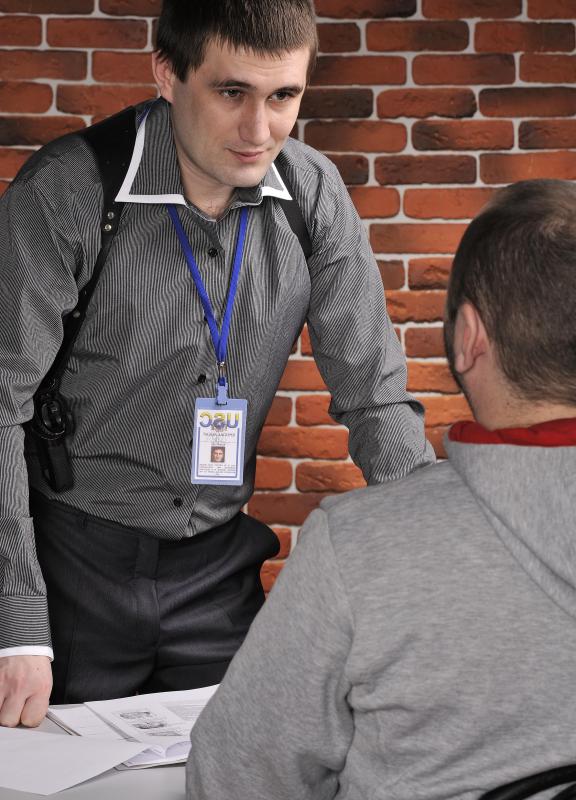At WiseGEEK, we're committed to delivering accurate, trustworthy information. Our expert-authored content is rigorously fact-checked and sourced from credible authorities. Discover how we uphold the highest standards in providing you with reliable knowledge.
What is a Criminal Conviction?
A criminal conviction results when a prosecutor proves in a court of law that a given individual violated the penal code or common law rules. Within each society, rules exist that — if violated — subject a person to criminal prosecution. In many societies, including the United States, those laws exist both in common law, or judge made rules, and in federal or state statutes passed by the legislatures.
The body of criminal law is designed to ensure widespread protection of all citizens. It makes illegal certain behaviors that are bad for public health or that violate the moral code of society as a whole. The violation of these criminal laws come with penalties.

A person who violates the body of criminal law enters into the criminal justice system. While the process differs slightly from country to country, usually the police will investigate a crime to determine who was responsible for the violation. In some cases, the police may directly observe a crime — such as seeing someone drive drunk — and no investigation will be required.

When there is sufficient proof of a person's guilt, an officer of the court — normally a prosecutor — will seek permission from the court to arrest the party. This is called an indictment. The party is then arrested and brought to court to enter a plea of either guilty or not guilty and to then stand trial for the crime.
During a criminal trial, the prosecutor presents evidence aimed at getting a criminal conviction on the accused party. This evidence is presented to a judge and a jury and then the judge or jury determines whether the accused criminal is guilty or innocent. Rules of evidence apply which limit the type of proof a prosecutor can introduce, and standards exist to determine exactly what the prosecutor must prove to get a criminal conviction. In the United States, for example, the prosecutor must prove that the accused defendant was guilty beyond a reasonable doubt for the jury to convict.

When a criminal conviction is handed down by the judge or jury, penalties follow. The penalties depend on the type of conviction and the seriousness of the crime. For a criminal conviction for a minor crime — called a misdemeanor in the United States — the penalties may involve a fine or community service. For a more serious conviction, such as murder, the penalties are much more severe and may even constitute death.
AS FEATURED ON:
AS FEATURED ON:















Discussion Comments
@starrynight - I'm not actually sure our legal system needs to have so many steps. The whole process of indictment seems pretty redundant to me. If they have enough evidence to arrest someone of a crime, they should be able to do so. I think indictments really just waste time.
@kentuckycat - I'm pretty sure a no contest plea basically means they are accepting a plea bargain and not entering a plea. I could be wrong though, that's just what I've gathering from watching crime shows!
I'm personally glad there are so many steps in securing a criminal conviction. I think it's important the innocent people not be convicted of crimes. If this means the legal process takes a bit longer, I think that's all right.
@Izzy78 - I have always wondered something about the term "no contest." Does pleading no contest mean that the person is free from a criminal conviction and they are simply accepting whatever penalties the judge gives them or are they still suceptible to prosecution and a criminal conviction? This is something that I have always wondered and feel like I am not alone in not understanding what the concept means.
@jcraig - I agree. The goal of any prosecuting attorney is to get a conviction from the court and this cannot be done unless the entire process described in the article is followed step by step and perfectly in the right manner.
A criminal conviction means the person will be sentenced and usually has penalties that follow. However, sometimes to avoid a criminal conviction the defendant may plead "no contest" and take whatever penalties are given to simply avoid the criminal conviction.
Although criminal convictions are seen as the goal of anyone trying to put a guilty party in jail, sometimes guilt is proven in the court of law with no criminal conviction.
The court of law is a very interesting place as there can be many instances in which an obviously guilty party is set free due to either not enough evidence beyond a reasonable doubt or if the courts or police somehow bungle the case.
There are many instances in which someone is obviously guilty but no criminal conviction occurs due to various reasons, such as evidence taken illegally or the defendant was had their rights trampled on in some way. When someone no criminal conviction occurs the person is not necessarily found not guilty, they are simply set free with their guilt being known.
Post your comments